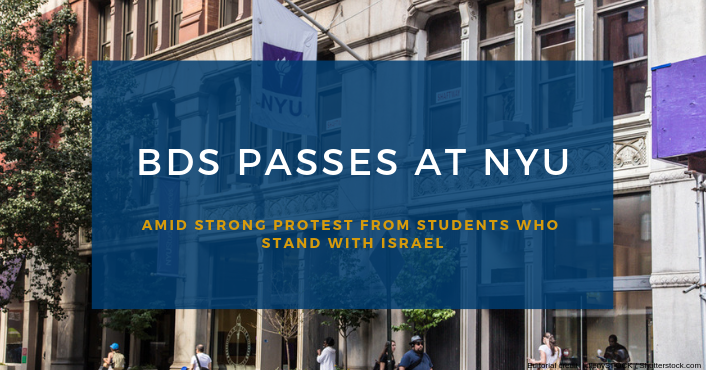In a recent vote at New York University, the Student Government Assembly passed a Boycott, Divestment and Sanctions (BDS) type resolution to divest from companies that do business with the Israel Defence Forces, effectively taking an offensive position against Israel.
The passing of the resolution means that the NYU SGA supports ending business with firms that work with Israel by providing it with war materials such as helicopters and bulldozers. Specifically, the proposal, titled “Resolution on the Human Rights of Palestine,” asked NYU to cut their ties with four firms: Caterpillar, General Electric, Boeing and Lockheed Martin.
However, NYU President Andrew Hamilton has previously denounced the BDS movement against Israel.
“The university exists to bring people together, not to separate them. For this reason, I am opposed to BDS. The university will not participate in boycotting of academics based in Israel,” he said. “We believe in academic freedom and the free flow of ideas. Boycotting is antithetical to that vision.”
BDS is a controversial topic, especially when it comes to college campuses; some students believe that Israel is being unfairly targeted.
Eli Lenner, freshman at the Stern School of Business, told Jewish News Syndicate that “BDS is a movement founded by [someone] who doesn’t believe in the right for the existence of a Jewish state. Jewish students at NYU lack proper representation, and because of their lack of a voice, radical movements that are innately anti-Semitic are able to gain traction.”
Lenner is not alone in his views. Jackson Maier, student at NYU who campaigned with Realize Israel, called the day the resolution passed a “sad day” because “a boycott is usually against a corporation or conglomerate, but this resolution is about Israel, and I feel that it’s ultimately about the Jewish people.”
Lenner’s claim is not without merit. The BDS movement, founded in 2005, supports the Palestinian cause for independence by pressuring Israel into defeat. The BDS’ goal for a one-state solution can be viewed as anti-Semitic: it seeks to replace Israel with a non-Jewish state.
Thousands of Palestinians depend on Israeli companies to make a living and by divesting from Israeli companies, BDS counteractively threatens their livelihoods as well. BDS is spread across college campuses through student organizations like Students for Justice in Palestine who are said to goad universities to divest from companies that associate with Israel.
This type of anti-Semitism affects Jewish students everywhere. Not only does BDS reject the existence of Israel as a Jewish state, it denies the Jewish people the unalienable right to self-determination.
The BDS movement disguises anti-Semitism through anti-Israel acts and it is important for students from colleges with high Jewish populations, like Queens College, to be aware of BDS as a movement so they know the effective ways to respond to it.
However, the initial passing of the resolution was almost expected by some because of NYU’s history of anti-Zionism. Last year, 53 student groups in NYU took a pledge to boycott Israel and two pro-Israel campus organizations on campus. Two students were arrested for assaulting a student and setting an Israeli flag on fire during a Realize Israel event, and the Jewish Student Center had to temporarily close because of Anti-Semitic and possibly threatening posts.
These unprecedented actions of breaking relations with the Jewish and Zionist student organizations on campus created a sense of lingering animosity.
Those in favor of the resolution claim that by divesting from companies that companies that do business with Israel, virtually “funding” their existence and “illegal occupation,” are complicit in the crimes Israel commits and are also at fault for violating human rights.
This resolution, co-authored by an Israeli Jew, Rose Asaf, was made to be the first of its kind at NYU since the divestment of all South African businesses during the apartheid era. Asaf, aware of being at odds with the Trustee’s position against using the endowment for taking political positions, says she needed to use her voice to “uplift Palestinian voices…it really comes down to the fact that my tuition money that I pay to NYU, is being used in violation of international law.”
Asaf is not the first to attempt to endorse BDS on US campuses; similar resolutions were successfully passed at Stanford, Yale, Barnard, and George Washington University.
Anti-Zionism and Semitism on college campuses is spreading at an unprecedented rate and students all around should be educated on how to respond to BDS conversations on campus.
Merle Dweck is a CAMERA fellow studying Finance and Economics will be graduating in May 2019.














